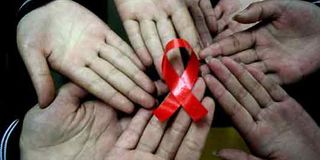Five key numbers on AIDS

What you need to know:
Roughly 1.8 million people worldwide contracted the virus that causes AIDS in 2016. That figure breaks down to about one HIV infection every 17 seconds, or almost 5,000 per day.
- Two-thirds of new cases in Africa
Paris, France /AFP/. Ahead of World AIDS Day on Friday, here is a snapshot in numbers, based on UN data, of the deadly disease which was identified in the early 1980s.
- 17 seconds -
Roughly 1.8 million people worldwide contracted the virus that causes AIDS in 2016. That figure breaks down to about one HIV infection every 17 seconds, or almost 5,000 per day.
- Two-thirds of new cases in Africa -
Since 2010 the rate of infection among adults has decreased slowly from 1.9 million to 1.7 million per year in 2016. Two-thirds of new cases occur in Africa.
- Children's cases cut almost by half -
New infections among children have fallen sharply: since 2010 they have been cut almost by half from 300,000 to 160,000 in 2016.
A key factor has been detection among pregnant women in Africa, followed by treatment with anti-retroviral drugs that protect their baby.
- Nearing 40 million with HIV -
Close to 40 million people live with the virus today. UNAIDS put their number last year at 36.7 million.
The number continues to increase, however, owing to continued transmission of the disease and increased access to anti-retroviral drugs in developing countries which has raised the survival rate of HIV-positive people.
- Deaths halved -
AIDS-related deaths have declined by almost 50 percent since a peak of 1.9 million in 2005, to 1.0 million in 2016.
Some 20.9 million people now have access to treatment which is effective when followed regularly.
Some 76.1 million have been infected since the AIDS epidemic erupted in 1981 according to UNAIDS, with 35 million dying over that period.


